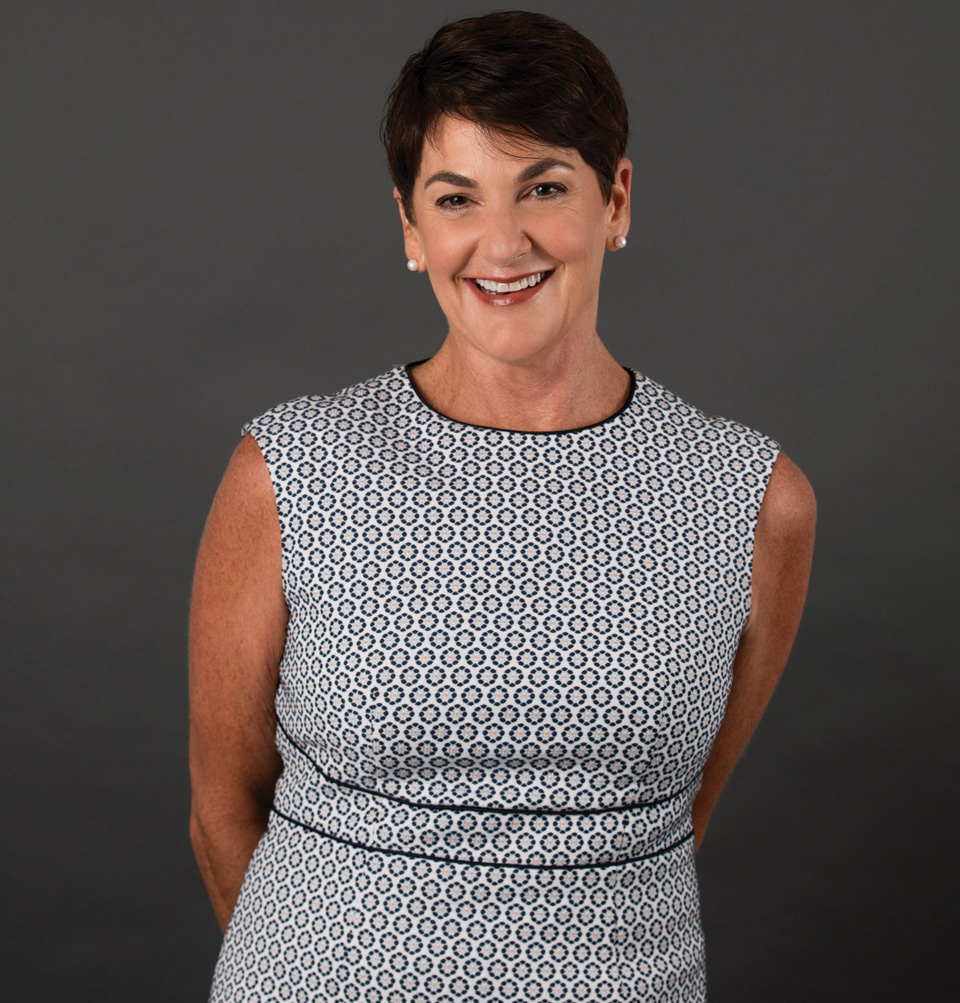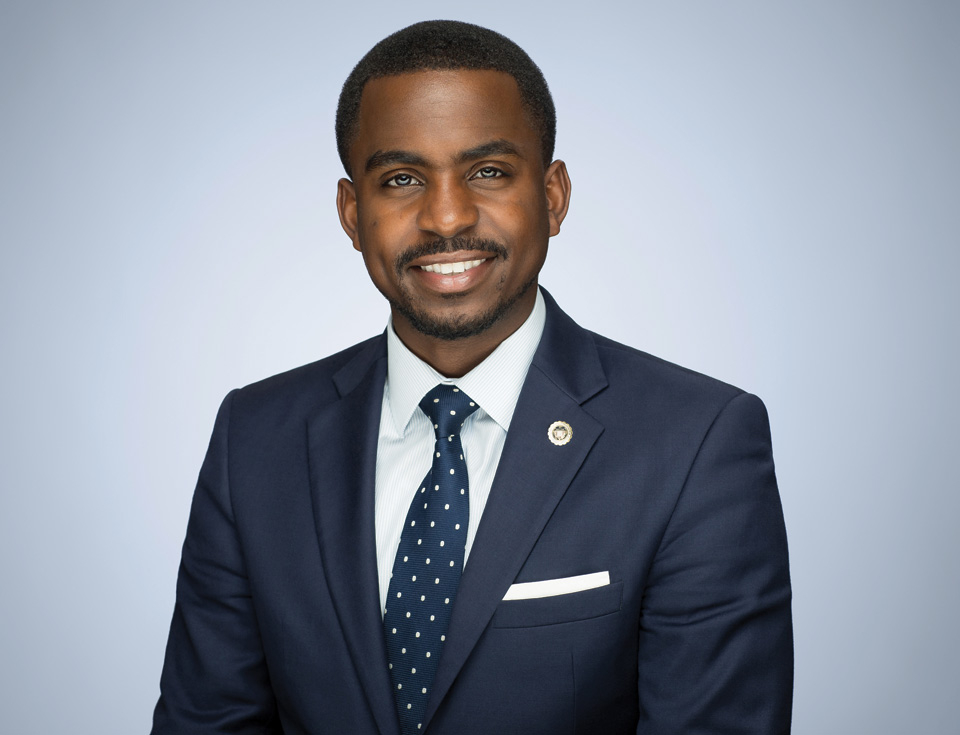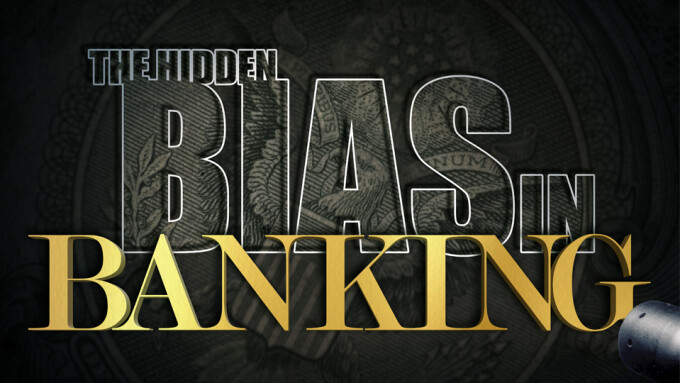Ask most people what they remember about the 1997 film “Boogie Nights,” and they’ll probably recall Heather Graham dancing around as Rollergirl, or the infamous pool party, or Mark Wahlberg finally — spoiler alert — unveiling his prosthetic penis.
But ask sex workers, or people in the adult industry, and chances are they’ll bring up the movie’s most devastating scene: when lovebirds and adult performers Buck Swope and Jessie St. Vincent — played with dead-on accuracy by Don Cheadle and Melora Walters — show up to their local bank branch to apply for a simple business loan, only to be summarily turned down when the loan officer realizes what they do for a living.
“You’re not being fair,” Cheadle argues. “This isn’t fair.”
“This financial institution cannot endorse pornography,” is the only explanation provided to justify this blatant example of banking discrimination.
Although “Boogie Nights” portrays the industry in the late 1970s and early 1980s, anyone involved in the business can tell you: that particular scene still packs the same punch. That’s because, unfortunately, things haven’t changed much. If anything, between the unstoppable rise of the internet and the irreversible trend away from cash transactions, things may have gotten worse. Financial institutions are still not being fair to adult businesses and sex workers.
It makes sense, then, that the adult industry’s trade group, Free Speech Coalition (FSC), has made it a top priority to fight banking and financial discrimination.
In April 2022, the FSC board of directors voted to confirm Alison Boden as executive director. From the very beginning of her tenure, Boden ranked fighting banking discrimination first among the causes she intended FSC to tackle in an increasingly hostile political and legal environment. Ever since then, she has been marshaling industry stakeholders, supporters and resources in a strategic effort to reverse widespread misconceptions and prejudices against adult businesses and sex workers among legislators, regulators and financial decision-makers.

During the past year, Boden steered the trade group through a number of initiatives aiming for that goal. FSC partnered with SexWorkCEO, led by sex worker, activist and entrepreneur MelRose Michaels, to produce “Financial Discrimination and the Adult Industry,” a survey of 600 performers, creators, business owners, executives and industry professionals, which yielded useful data on the extent and nature of de-banking and other financial discrimination.
Armed with this data, FSC staff, directors and members then met with politicians, regulators and financial institutions. In May, the campaign culminated in an extremely productive trip to Washington, where they held over a dozen in-person meetings with House and Senate offices of both parties, and hosted a congressional reception for House lawmakers and staffers.
Images from that trip — industry stakeholders on the steps of the U.S. Capitol, being received like any other legitimate business group — provided visible proof of the effectiveness of Boden’s strategy, which also included formally engaging professional lobbying teams from FSVector and Clarity Consulting.
Joining Boden and the lobbyists in Washington were FSC Director of Public Affairs Mike Stabile and Board Treasurer Cathy Beardsley (Segpay); FSC members like sex worker and activist Allie Eve Knox (Spankchain); APAG President Alana Evans; BIPOC Collective’s Sinnamon Love; pleasure product entrepreneur, sex educator and influencer Zoe Ligon (Spectrum Boutique); certified financial planner Jessica Goedtel (Pavilion Financial Planning); veteran producer Fivestar (Filthy Communications) and industry crypto entrepreneur Jessica Van Mier (MintStars, Harvard Kennedy School).
Earlier this year, FSC organized a full day of panels during XBIZ LA, several of which centered around the fight against financial discrimination.
Speaking exclusively to XBIZ for this report, Boden explains that the sheer scope of financial discrimination against adult businesses has shocked both FSC officers attempting to fight it, and also their new non-industry interlocutors. FSC has made available through its webpage a form for members of the community to report specific instances of discrimination.
“Almost everyone in adult has a horror story,” Boden says. “A lot of it is banks either closing accounts, or refusing to open them at all. That’s the vast majority of cases, but we’ve also seen people being denied simple business tools, like loans and insurance. Beyond that, digital wallet, peer-to-peer services like PayPal, Stripe, Venmo and others can close accounts, and do. The difference between that and a bank account getting closed is that, whereas banks legally have to give it back to you at some point, those digital wallets are allowed to keep your money.”
Being refused a bank account, Boden notes, can have a devastating effect on anyone trying simply to exist.
“If you can’t get an account at all, you are essentially locked out of the economy,” she says. “There really is no way to exist in society at this moment without a bank account. How would you pay your rent? How would you do anything?”
As FSC has been stressing to politicians, some of whom morally oppose sex work and view stigma against adult businesses and individuals as legitimate, cutting people off from financial networks may lead to extremely damaging consequences.
When people are denied bank accounts and credit cards, Boden explains, “the worry there is that, not only does it just really limit people’s ability to operate, it also can push them into dangerous situations, and make them vulnerable to trafficking.”

One Word: Discrimination
Solomon Friedman, partner and VP at Ethical Capital Partners (ECP), the Canadian private equity firm which in March acquired MindGeek — recently rebranded as Aylo — tells XBIZ that a three-month consultation period, with the assistance and support of its advisory board, revealed a number of recurring themes of concern among stakeholders, from content creators and sex workers to regulatory experts and financial institutions.
“The first one is that the adult industry is quite unique in that it is an entirely legal and, in many jurisdictions, heavily regulated industry,” Friedman notes. “It is fully legal, and yet it has historically faced persistent banking discrimination.”
Unlike the cannabis sector, which faces financial and banking issues directly caused by its illegality in the U.S. at the federal level, the adult industry, Friedman stresses, is not only legal, but constitutionally protected.
“People need to understand the magnitude of the problem,” he adds. “We have people who are doing absolutely nothing wrong, who are engaging in legally protected work and yet they find themselves discriminated against when it comes to some of the most basic financial services.”
The creators surveyed by ECP spoke of the unpredictability that makes it unnecessarily difficult to work in the adult space.
“You never know — based on news articles or public sentiment, or based on pressure put on particular institutions at particular times — you never know if your bank account will be shut down, your mortgage will be called in, your credit card will be deactivated,” Friedman explains. “You go from one day working in a perfectly legal space operating a legitimate business, to the next day having no access to basic financial services. There is a word for this: discrimination.
“It’s one that we don’t use lightly, but it is absolutely accurate,” Friedman adds. “People engaging in a legal and constitutionally protected form of free expression are having their ability to earn a living curtailed as a result of, essentially, policy decisions made by financial institutions.”
A Process Full of Uncertainty
As Friedman noted, compounding the issue of discrimination is the uncertainty factor. When banks refuse to open accounts, Boden adds, “they almost never actually explain why, and when they close them, in no situation are they open about the reasons.”
Bank representatives will often say things like, “As part of a routine review, we are closing your account,” or “We cannot tell you why we’re closing your account,” or else allege some kind of fraud or “suspicious activity.”
“Since they are not giving you details,” Boden continues, “you cannot state your case that the supposed ‘suspicious activity’ didn’t happen or that it was misinterpreted. There’s no way to appeal it!”
According to current laws, a bank can refuse service or close accounts for basically any reason, provided the decision is not made because a person belongs to a specifically protected class, as in the case of discrimination due to race or gender. Unfortunately, although sex workers are demonstrably one of the most discriminated against and stigmatized groups in human history, they are not a “protected class” in legal terms.
A key part of this secretive process is the regulatory scheme within which financial institutions operate in the U.S. Banks operate under the watchful eye of several, often overlapping, government regulators like the Federal Deposit Insurance Corporation (FDIC), the Office of the Comptroller of the Currency (OCC) and the Financial Crimes Enforcement Network (FinCEN) under the Treasury department.
Such acronyms are regularly deployed — sometimes without further explanation, sometimes combined with appeals to the Bank Secrecy Act (BSA) and anti-money laundering (AML) measures — as the supposed reasons behind a bank’s refusal to treat adult businesses and workers like everyone else.
Banks’ compliance with the BSA follows standards set by the Federal Financial Institutions Examination Council (FFIEC), which produces a manual listing red flags associated with things like money laundering and terrorist financing. These sections serve as a baseline, which is supplemented by FinCEN advisories. Two of those advisories, issued in 2014 and 2020, concern “human trafficking red flags.” An international consortium called the Anti-Human Trafficking Intelligence Initiative (ATII) also publishes red flags that may affect miscategorized, legal adult businesses.
Boden offers a series of concerning examples, including “Customer uses a personal account for business purposes” (FFIEC manual); “Frequent payments to online escort services for advertising” (FinCEN 2014); “A customer’s account shares common identifiers, such as a telephone number, email, and social media handle, or address, associated with escort agency websites and commercial sex advertisements” (FinCEN 2020); “Transactional activity (credits and/or debits) inconsistent with a customer’s alleged employment, business or expected activity, or where transactions lack a business or apparent lawful purpose” (FinCEN 2014); “Account is funded primarily via cash deposits and funds transfers from other individuals” (ATII); “Funds transfers received from or to the benefit of unrelated third parties” (ATII); and “Customers frequently appear to move through, and transact from, different geographic locations in the United States” (FinCEN, 2020).
The BSA, Boden notes, “essentially makes banks an arm of law enforcement. The bank is monitoring every transaction you make for ‘illegal activity,’ and they are required to report anything that, in their opinion, seems questionable, to law enforcement.”
Banks report these cases by issuing Suspicious Activity Reports (SARs), the mere existence of which has been used by some members of the press to smear targets in the adult sector with an implication of guilt.
SARs are secret, Boden explains, “so no one is allowed to see them other than the banks and law enforcement. There’s no way to know whether they’ve been filed against you. They regularly get filed by bank staff when a customer does something that FinCEN has labeled as suspicious. And it’s not just FinCEN; all the regulators collaborate on these rules.”
These rules are part of the Commercial Bank Examination Manual, issued by the Federal Reserve. Every bank gets examined by FDIC or OCC, at least once a year, if not more often.
“The regulators want to make sure that the bank is compliant with their rules,” Boden notes. “So they have created this whole handbook about what kinds of transactions you should be flagging. And that list includes things that don’t make a ton of sense.”
In the case of the adult industry, red flags for transactions that may result in an SAR or an unexplained account closure include activities that regulators suspect may be connected to human trafficking.
“I don’t understand many of these,” Boden laughs. “They want bank staff to watch out for things like: if someone is traveling around the country, and staying in hotel rooms in a way that doesn’t comport with the type of business they claim that they’re doing — men buying lingerie or certain items of clothing, things like that. The implication, if you read the handbook, is that a customer is doing those things because they’re forcing people to have sex for a living? It does not make any sense.”
Segpay’s Cathy Beardsley tells XBIZ that, at least within the U.S., any of the large public banks “want nothing to do” with adult, whether it’s acquiring, processing or setting up bank accounts, or settlement accounts.
“The minute they find out that a merchant is transacting in the adult industry, they close them down,” Beardsley adds. “There’s no reason provided. You’re just given a letter that says ‘Your account is closed.’”
‘Reputational Risk’
A source consulted by XBIZ for this report, who is familiar with bank protocol reports, spoke with a bank employee who works in the department that reviews red flags. The employee told them that if they see a combination of red flags, they will file an SAR.
Banks frequently close down accounts that generate SARs, even if it is merely on suspicion based on some of the manual’s questionable “red flags.” The reason generally given for this is “reputational damage,” yet another blanket justification banks fall back on to refuse service to adult businesses and sex workers.
“Essentially, they want to stay out of the news,” Boden clarifies, describing the bank officers’ frame of mind as, “If somebody found out that this person was banking with us, would it cause a problem?”
In the case of adult, the stated fears by some of these bank insiders concern nightmarish imaginary headlines about their institution being caught providing financial services to “a prostitution ring or a human trafficking ring.”
In practice, of course, banks’ tragic fantasies about shadowy “rings,” perhaps derived from conspiracy propaganda and internet paranoia, lead to overzealous scanning for illegal activities — which ends up focusing on suspected consensual sex workers, like escorts.
“They can see every single thing coming into and out of your account,” Boden explains. “So if you’re getting a lot of Venmos from people that they have not identified as related to you, that may be suspicious to them and result in an account review.”
Some of the guidance for fighting supposed human trafficking also snares perfectly legitimate adult businesses. This is due in part to the long shadow of Operation Choke Point, an Obama-era initiative under Attorney General Eric Holder.
Under the auspices of fighting money laundering, Operation Choke Point flagged a hodgepodge of business sectors and categories as “high-risk,” including ammunition sales, cable box descramblers, dating services, drug paraphernalia, escort services, fireworks sales, home-based charities, money transfer networks, online gambling, racist materials, telemarketing, tobacco sales — and pornography. Banks were instructed to place these businesses under heightened scrutiny, which resulted in several account closures and denials of service.
The Trump administration ended Operation Choke Point in 2017, touting its demise by pointing out that it discriminated against legal businesses rather than minimizing or eliminating money laundering risks.
Paradoxically, Operation Choke Point has given FSC a helpful talking point when addressing conservative and right-of-center politicians.
“Republicans are still mad about it,” Boden says. “Especially because certain industries that support them had trouble getting banking — companies involved in oil and guns, for example. So it is a useful reference to illustrate the issue for them. Democrats are a little bit sensitive about Choke Point because it happened under Obama. They’re more interested in just sort of the basic fairness aspect, the discrimination against minorities.”
Beardsley, who participated in the Washington trip, describes lawmakers as having “no clue about what is happening” with banking discrimination in the adult industry.
“We had to explain to them that we are legal businesses, and we should therefore have access to banking,” she recalls. “Having access to banking is a right.”
Kafkaesque ‘Red Flags’
Although Operation Choke Point has been defunct for over five years, it may still play a role in the “red flag” system behind much of banking discrimination.
“What they decided to flag, or how they programmed their algorithm to pick up certain transactions, is entirely internal to each bank,” Boden says. “There’s nothing public that they have to publish regarding what they’re looking for, or how they determine risk.”
Instead of citing Eric Holder’s “high risk” smorgasbord, banks nowadays target the same businesses under the rubric of avoiding reputational risk, meaning anything that might incur negative publicity.
“You get bad press, your stock price goes down, your bank becomes unstable, you fail,” Boden says. “That’s what they care about.”
Reputational risk can also be manufactured by, for instance, religiously inspired groups that object to an entire industry on moral grounds — especially when such groups have enough tax-free money, resources, and access to gullible partners in the mainstream press. Aylo and Pornhub learned this the hard way in December 2020 and the months that followed.
ECP/Aylo’s Solomon Friedman says there’s no question that at the root of much banking discrimination is disinformation and misinformation campaigns by anti-adult activists.
“There is a cynical side to those campaigns,” Friedman observes. “Because while on one hand, those involved in such organizations often claim to be working towards the benefit of the vulnerable or marginalized, what they are actually doing in reality is placing people in either vulnerable or precarious situations by pressuring financial institutions to withdraw services.”
Friedman feels that prominent adult stakeholders, such as his companies, “have an obligation to fight these campaigns at their source, to directly counter misinformation and disinformation. That’s where I’m really hopeful for the future. In the financial services industry, as we are open and transparent about who we are and what we believe in, we’re seeing some of those walls starting to come down.”
Beyond outright propaganda, another factor that can affect banking for sex-related accounts is the internal, subjective feelings of people who work for or are connected to the bank.
FSC member Fivestar has owned an adult film production company since 2016, creating independent content as well as content for larger companies.
“The first time I encountered banking discrimination was when QuickBooks barred my company from accepting business-to-business online invoice payments due to the ‘nature’ of the work,” Fivestar tells XBIZ. “We also produce adult educational events and were working with a supportive event platform that required us to have a Stripe account to sell tickets. Pretty soon after we opened the account, Stripe closed it because of restrictions on mature content. These were minor inconveniences compared with the highly stressful and disruptive loss of our bank account at San Francisco Fire Credit Union, due to a board member’s personal objections to the adult industry.”
Disregarding its own motto — “Where Members Come First” — the credit union allegedly chose to side with a board member who didn’t approve of porn, and Fivestar’s account was summarily shut down. The producer shared these instances during the FSC trip to Washington.
One of the things that has surprised Boden while engaging with financial sector officers and regulators is that they do not understand some very basic practices of legal adult businesses.
“They literally have no idea of what the standards are for adult businesses,” she says. “They seem to think that our businesses operate like… I don’t know what they think, actually. But definitely not like every other freaking business!”
When FSC spoke to regulators, she says, they wondered out loud if OnlyFans payments, some of which are substantial amounts of money, were “labeled like income.”
“Do they 1099 the creators?” they asked an incredulous Boden, who replied, “Yeah, it’s a business, and they’re paying you money.”
“Basically,” she reveals, “they don’t understand at all how our business works, and were generally predisposed to expect the worst.”
For an individual — or an industry — to have to fight these serious yet vague accusations brings to mind the stereotype of a Franz Kafka protagonist, or the prisoner of a tyrannical regime.
“It is really, really difficult to disprove something,” Boden says. “For whatever reason, in the minds of these regulators, our industry is attached to a risk of human trafficking. How do you prove that it isn’t? The irony ends up being that this unfounded belief is actually putting people at risk of being trafficked, because they can’t get a bank account.”
Moreover, she adds, the regulators have a hard time applying Occam’s razor and understanding a much simpler reality: “It would be really, really stupid for a trafficker to actually get involved in something as public as content production.”

A Payment Processor’s Point of View
Beardsley sees the arbitrary nature of banking discrimination as “the No. 1 thing that really can impact and hurt the adult business.”
Banks, Beardsley points out, “will process for us all day long — they like the high margins. But then we won’t actually be able to settle the funds. It is really problematic.”
Things have gotten even more arbitrary over the last year, during which 20-30% of Segpay’s merchants had to change bank accounts when their previous one were closed, Beardsley reports.
“It just creates a lot of problems,” she says. “On our end, we end up holding funds, and we don’t want to be holding funds. On their end it’s even worse: they are scrambling to get their new bank account. It really turns the whole business upside-down. If the merchants don’t have a bank account, they can’t pay their affiliates or content creators, or their team members.”
In the case of content creator payouts, Beardsley explains, the many small payments going out spark money laundering concerns. On the flip side, if a content creator’s account is receiving numerous small payments, that also flags the bank and their accounts will get shut down, with no questions asked.
As a FinCEN-compliant payment facilitator, Segpay devised a solution to help merchants do content creator payouts.
“We actually set up a Visa card, which works globally,” Beardsley explains. “We can send money to that card for their content creators. We’re basically paying for that card in order to fund these content creators. So it’s kind of money out of our pocket, but we wanted to have that service in place, so we can get the content creators paid out.”
A clips store that is signed up with Segpay, for example, can offer content creators the chance to sign up for that Visa card, and then tell the processor what funds to settle to their cards each week. The content creator would then be able to use that card anywhere they want to make purchases, or withdraw money from it at an ATM — thus sidestepping the complications created by banking discrimination.
“That’s been our goal these last two years,” Beardsley shares. “To add content creator payout solutions into our platform.”

Credit Card Companies as Censors
A less-often discussed dimension of financial discrimination is how credit card companies, through what are fairly mundane payment processing decisions, can end up monetarily rewarding certain kinds of content and creators while punishing others.
A study titled “The Impact of Mastercard’s Adult Content Policy on Adult Content Creators” concludes that discriminatory financial and platform policies “violate sex workers’ human and civil rights and infringe on people’s sexual freedoms … more needs to be done to monitor and take seriously the impacts of these policies after they are passed, so that negative outcomes can be corrected and further harms can be prevented.”
The study was authored by Val Webber, a postdoctoral researcher in pornography and sexual and public health at Dalhousie University, a member of the Aylo advisory board and a former adult performer.
“I focused on the way that financial institutions have operated as, essentially, moral arbiters of content,” Webber tells XBIZ.
Although Mastercard always had “special requirements” for adult content, in the aftermath of The New York Times’ attack on Pornhub, the company changed its policies, resulting in several creators reporting a sharp drop in their incomes.
“Platforms were fully taking content down to re-upload it after reviewing it, and they were really slow to review new content,” Webber says. “A lot of content was being denied based on Mastercard’s extremely vague guidelines.”
Creators who had fantasy or vampire content, for example, would find it newly demonetized or taken down, based on rules about posting anything that could remotely be construed even to depict nonconsensual activity.
“The actual specific terminology Mastercard used,” Webber notes, “is that you cannot use keywords or search terms that suggest that the site contains ‘depiction of nonconsensual activities’ or content that is ‘potentially illegal or otherwise in violation of the Mastercard standard.’ What does that mean? It doesn’t mean anything specific.”
It quickly became a game of broken telephone, with the creators stuck at the bottom of the totem pole and seeing their income decimated.
Mastercard, Webber explains, “did not want anything that could be brand-damaging in any kind of way, and then the payment processors are also trying to be really careful. So they’re being extra, extra cautious. And then they’re passing that down to the platform, which also wants to be extra cautious, and are passing even more restrictions down to the performers. The more risk-averse platforms are going to be very quick to demonetize content or ban content ‘just in case Mastercard has an issue,’ because no one ever knows.”
Webber’s study shows that several creators had to pull a very substantial amount of their content.
“Less content means less income,” they point out. “They had a clear drop in sales, with some people seeing 50% of their monthly income vanish overnight.”
Meanwhile, mainstream producers could continue monetizing all kinds of content representing “bad” situations.
“It’s a double standard with porn,” Webber says. “In any other kind of artistic medium you can monetize war, murder, things that aren’t possible in real life, fantasy, ethically dubious relationships. You can show anything you want, because the understanding is that it’s fictional. But once it comes to porn, they treat it as if it is a documentary, and it needs to be held to the same standards as ‘real life’ experience.”
A Cause Worth Fighting For
FSC is not only fighting against discriminatory practices on behalf of its members and others in the community. The trade organization itself, which does not produce any pornography whatsoever, has been denied four bank accounts just during Boden’s tenure.
“It’s not just creators,” she explains. “It’s not just businesses. Even just being associated with adult, we can’t get bank accounts, and we’ve been threatened with account closure.”
One FSC member recently attempted to open a business account with U.S. Bank, and was made to sign a statement assuring the institution that they were not involved with “adult entertainment.”
One regulator that may hold banks accountable for such flagrant instances of discrimination is the Consumer Financial Protection Bureau (CFPB), which is responsible for defending consumers from abuses by financial institutions. CFPB has the ability to keep track of instances of discrimination, contact other regulatory agencies to intervene, and contact banks on a consumer’s behalf.
FSC is currently putting together a template form that will help victims of financial discrimination file a CFPB complaint more easily.
“CFPB can say, ‘Hey, you need to resolve this issue!’” Boden explains. “They’re actively trying to help. If we can get folks to start filing these complaints, it will make a huge difference. Because on average, the number of account closure complaints they would get about this issue in a month might be a handful, five or so. If they all of a sudden get 15 in a month, that’s going to be a huge spike, and it’s going to alert them that there’s something going on here, and help our case when we’re talking to lawmakers.”

Although financial discrimination reaches far beyond the adult industry, FSC lobbyist and FS Vector principal Pierre Whatley points out, the adult industry is one of the only sectors where both businesses and individual workers are affected.
“Energy and extraction industries like oil and gas may face de-banking pressure, but the individuals working on the rigs largely do not,” Whatley says. “Those industries also have robust, well-funded networks in D.C. to advocate for them. When we first started working with FSC, we were shocked at the scale of the discrimination, but so were legislators.”
Over the past year, Whatley has noticed an increasingly positive reception among politicians, giving “a strong signal” that policymakers understand the issue and want to work with FSC and the industry on a solution.
“We’ve got a long road ahead,” Whatley acknowledges. “But we’re heartened by the response we’ve received.”
For ECP/Aylo’s Solomon Friedman, it is time for the adult industry to build trust, and to communicate what it does and how.
“That type of advocacy is what will change minds,” Friedman says. “We’ve seen promising signs in broader society. People are further recognizing the legitimacy of this kind of work. This is a safe and responsible industry.”
Ultimately, the message Boden wants to stress the most to everyone in the adult community, whether businesspeople or content creators, is one of hope.
“If financial discrimination happens to you, know that it’s not about you,” she concludes. “Feeling that way can be very upsetting for people. But know that there are things you can do about it. FSC is doing its best to stop banking discrimination — and by joining, you can help the fight to end it.”








